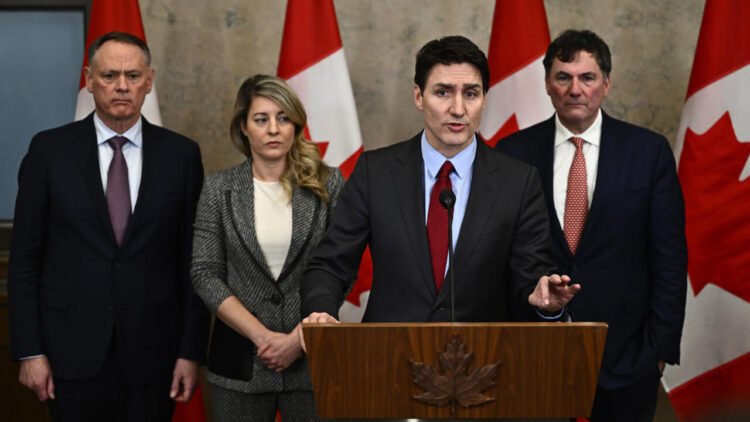As tensions between the United States and Canada escalate, President Donald Trump ignited fresh controversy on Sunday morning by attacking Canada on social media, claiming that without American economic support, it would “cease to exist as a viable country.” His remarks came just one day after signing an executive order imposing sweeping tariffs on Canadian imports.
U.S.-Canada Trade War Heats Up
The new tariffs, set to take effect on Tuesday, place a 25% duty on most Canadian goods entering the U.S., with energy exports facing a 10% tariff. In response, Prime Minister Justin Trudeau announced countermeasures, slapping a 25% tariff on $30 billion worth of U.S. products—an amount that is expected to increase to $155 billion later this month.
Trump’s Fiery Rhetoric
Trump’s inflammatory remarks didn’t stop at economic threats. He reiterated claims that Canada, Mexico, and China have engaged in a “decades-long ripoff of America,” blaming trade policies, crime, and drug trafficking for what he perceives as unfair treatment of the U.S. economy. He also suggested that Canada should consider becoming the “Cherished 51st State,” arguing that such annexation would eliminate the need for tariffs.
Provincial Leaders and Businesses Take Action
In response to the tariffs, Ontario Premier Doug Ford announced that all Liquor Control Board of Ontario (LCBO) stores would stop selling American-made alcohol starting Tuesday, cutting off nearly $1 billion in U.S. liquor sales. Similarly, British Columbia’s Premier David Eby ordered government-run liquor stores to halt imports from U.S. states that supported Trump’s trade measures.
Meanwhile, the Canadian business community is bracing for economic fallout, with some industries warning of potential job losses and price increases. The Distilled Spirits Council of the U.S. and Spirits Canada expressed deep concern, calling for an immediate reversal of the tariffs to prevent further economic harm.
Trudeau: ‘Canada Is Prepared’
Trudeau addressed Canadians, reaffirming that his government did everything possible to avoid a trade war but was left with no choice but to respond forcefully. “Canada will not be bullied,” he declared. The prime minister also met with his cabinet and provincial leaders to finalize a list of U.S. goods that will face retaliatory tariffs, set to be released on Monday.
Political Leaders Weigh In
Canadian political leaders have united in condemning Trump’s actions. Liberal leadership candidates Mark Carney and Karina Gould both issued statements supporting countermeasures, with Carney calling the tariffs a “clear violation of trade agreements” and urging a strong response. NDP Leader Jagmeet Singh labeled the tariffs an “economic attack” on Canada but reassured Canadians that “our values and solidarity will not crumble in the face of Donald Trump’s aggression.”
Trump Ties Tariffs to Border Security
The White House issued a statement justifying the tariffs under national security grounds, linking them to concerns about illegal immigration and the fentanyl crisis. Trump defended his decision on Truth Social, writing:
“We need to protect Americans, and it’s my duty as President to ensure safety for all. I made a promise to stop the flood of illegal aliens and drugs, and Americans overwhelmingly voted for it.”
Looking Ahead
As the standoff continues, economic experts warn that the trade war could have serious long-term consequences for both economies, potentially affecting industries from agriculture to automotive manufacturing. With tensions running high and no clear resolution in sight, the coming weeks will be critical in determining the future of U.S.-Canada relations.

 English
English



























































